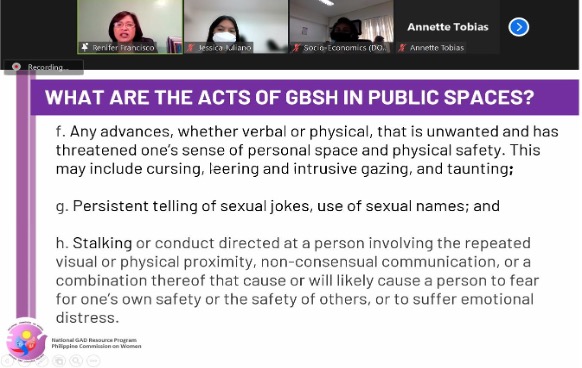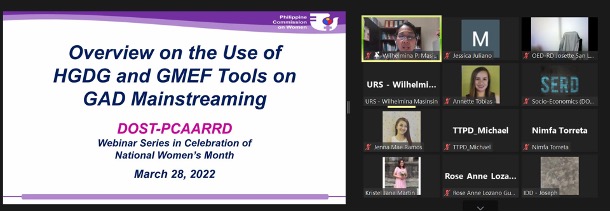
Two webinars were conducted by the Philippine Council for Agriculture, Aquatic and Natural Resources Research and Development of the Department of Science and Technology (DOST-PCAARRD) in celebration of the National Women’s Month. The "Safe Spaces Act" was featured on March 21, while the "Harmonized Gender and Development Guidelines (HGDG) and Enhanced Gender Mainstreaming Evaluation Framework (GMEF)'' was highlighted on March 28.
GAD advocate and certified trainer of the Philippine Commission on Women (PCW), Ms. Renifer Francisco, was the resource person for the Safe Spaces Act (SSA) webinar, attended by 40 PCAARRD staff members. She highlighted the salient provisions of SSA or the Republic Act No. 11313, also known as the Anti-Bastos Law. SSA covers all forms of gender-based sexual harassment (GBSH) committed in public spaces, educational or training institutions, workplace, and online space. GBSHs are acts committed through any unwanted and uninvited sexual actions or remarks against any person regardless of the motive. Catcalling or unwanted remarks, as well as sexist, homophobic, misogynistic, transphobic remarks are also forms of GBSH.
She shared that GBSH victims may file a complaint with the National Bureau of Investigation, Philippine National Police, and Department of Justice. If committed in the workplace, the victim can file a civil case, criminal case, or an administrative complaint with their respective Committee on Decorum and Investigation. The participants lauded the discussion of Francisco and felt very enlightened from her presentation.
On March 28, the last installment of the webinar series, Dr. Wilhelmina P. Masinsin talked about the use of the HGDG and GMEF Framework. Dr. Masinsin, a member of the GAD resource pool of the PCW; Head of the University of Rizal System Morong Campus GAD Center, and Program Coordinator of the CALABARZON GAD Resource Center, underscored the importance of conducting gender analysis as it identifies gender issue/s and design strategies, and ensures that the concerns of women are included in the development agenda.

She discussed the application of HGDG's ten core elements and the considerations in determining the gender-responsiveness of the programs or projects and the use of GMEF for gender mainstreaming processes in agencies. She mentioned the various levels of gender mainstreaming, and the GAD mainstreaming entry points that is Policy, People, Enabling Mechanisms, and Programs, Projects, and Activities. Majority of the 95 participants agreed that the session was informative and appreciated the detailed discussion of the tools.
The webinars are part of a series of webinars organized by the Gender and Development and Special Projects Unit (GADSPU) of the Socio-Economics Research Division for the 2022 National Women’s Month Celebration.
